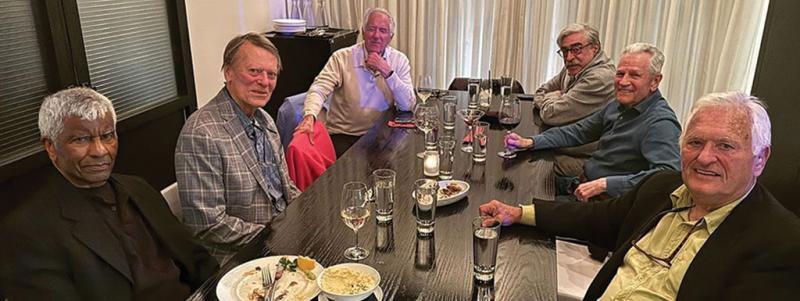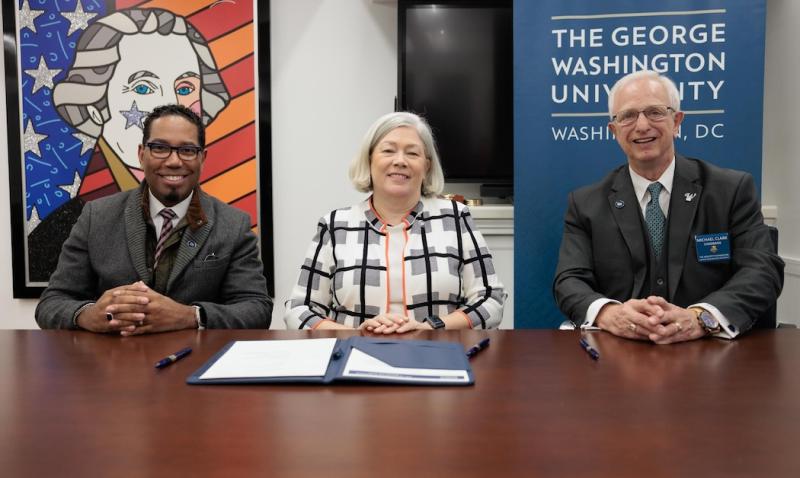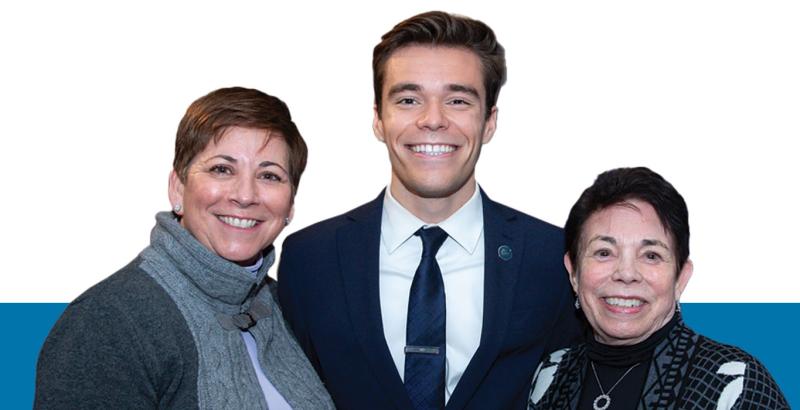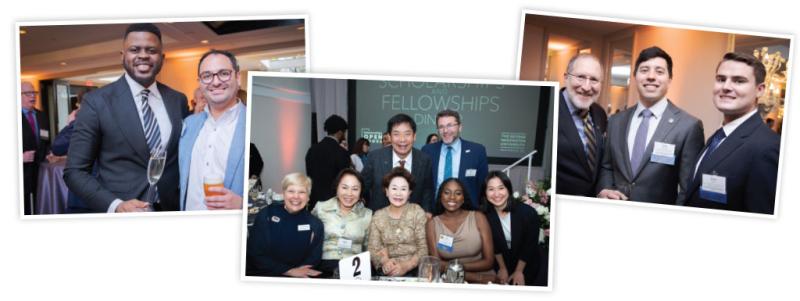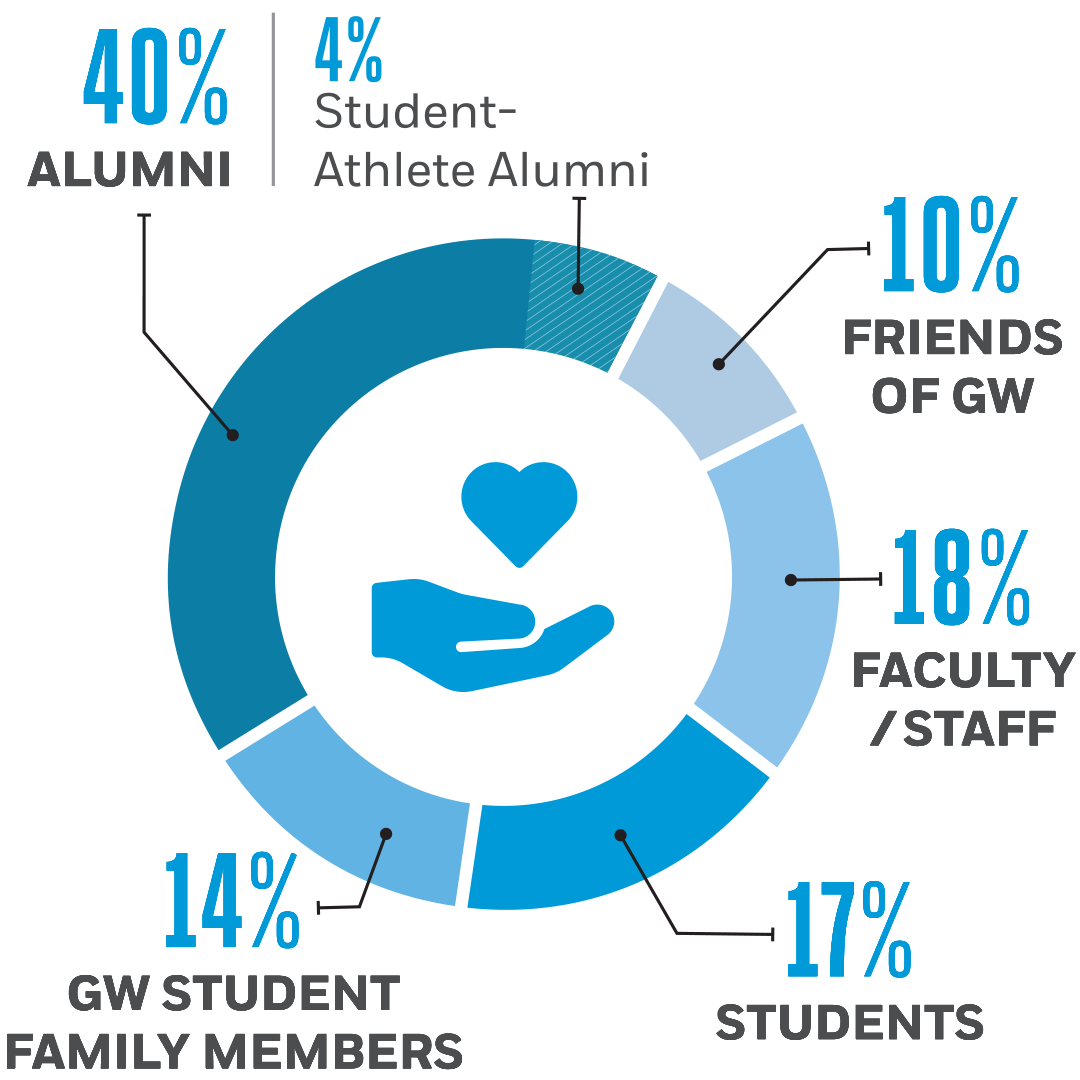The Impact of Philanthropy Spring 2024
Generous gifts transform lives and the greater world.
Increasing Access to Higher Education
A Chip Off the Old Block: Family Behind Utz Brands Endows GW Law Scholarship
Generations of GW alumni continue a long-standing family tradition of giving back with the Rice Family Foundation’s $1.6 million gift.
// By Mary Dempsey
More than a century ago, Bill and Salie Utz founded a potato chip operation in their Hanover, Pennsylvania, kitchen and began selling their product door-to-door. Today, Utz Brands, Inc., is the third largest branded salty snack platform in the United States, producing over 3.3 million pounds of snacks each week and generating more than $1.4 billion in annual sales. The pair’s grandson and his family are still involved in managing the now public company. With deep roots at GW, these alumni recently created a need-based scholarship to GW Law, the Rice Family Endowed Scholarship.
“My grandparents founded Utz, and they instilled in us an obligation to give back to the community,” said Utz Chairman Emeritus and Special Advisor Michael Rice, J.D. ’68. Rice started his family’s GW tradition, although a law degree wasn’t originally part of his career plan. Indeed, unsure of what he wanted to do with his life, he dropped out of college during his sophomore year. His father immediately put him to work at Utz shoveling potatoes in the potato cellar.
“By spring of that year, I said I didn’t want to do this, and I decided to complete college and then get a law degree,” Rice said. He passed the Pennsylvania bar exam after graduation but never planned to practice law as a career.
“I wanted the skills that come with a law degree,” he said, describing his GW Law education as “extremely valuable” in preparing him to join the leadership team at Utz. Rice and his wife, Jane, a former Utz public relations director, created the Rice Family Foundation in 2017. Their daughter, Stacie Rice Lissette, J.D. ’92, serves as director of the family foundation. The Buff and Blue is a family affair: Stacie’s husband, Utz Chairman Dylan Lissette, B.B.A. ’93, studied business economics and public policy. Their daughter, M. Payton Lissette, B.A. ’18, was a communications major. Dylan’s twin brother, James Lissette, B.A. ’93, earned a degree in political science, and his sister, Michele Schimpp, B.A. ’86, was a communications major. “My father and I both had really great experiences at the law school,” said Rice Lissette. “We were so blessed that we were able to go to GW Law, and we felt really fortunate that we didn’t have to go into debt to do it. We are conscious that this is not necessarily the case for others.
“We wanted to create this scholarship to pay it forward and give someone the same opportunity we had,” she said.
Michael Rice and many of his GW Law ’68 classmates have maintained their friendship for more than a half century. Pictured at a recent gathering are, from left: D.C. Superior Court Senior Judge Robert Tignor, Michael Rice, James Stein, Dolph Sand, Martin Snider and Larry Thomas.
GW President Ellen M. Granberg expressed gratitude for the family’s support of student scholarships, a top university priority. “GW Law offers unmatched exposure to some of our nation’s most respected legal scholars and practitioners,” Granberg said. “This generous gift helps support talented students who face financial challenges, allowing them to focus on their studies, take advantage of only-at-GW opportunities and gain a meaningful hands-on legal education, particularly in nonprofit and government service where funding is more limited.” Rice’s decision to study in the nation’s capital was driven by his admiration for the early U.S. presidents that grew out of learning to read with a set of childhood books given to him by his mother. He still keeps in touch with a sizable group of law school friends. “In those days, classes were divided alphabetically, so I knew everyone from R to Z,” he said. “A group of us have gotten together regularly through the years to share special occasions and stay in touch with each other.”
He and Jane were married between his first and second years of law school, and he was still a student when Stacie was born. To support his new family, he took a job at the Census Bureau and switched to night classes at GW Law.
GW’s connections to the Washington, D.C., community influenced Rice Lissette’s decision to attend GW Law. Even though her family was based in Hanover, her parents spent a lot of time in Washington when she was growing up. The city felt like home.
“I loved studying law in the nation’s capital. My professors were awesome, and my classmates were such a diverse group of people. And I loved the clinics. That kind of hands-on experience, to be able to use the skills I was learning, was really meaningful.” Today, she serves on the school’s Clinical Law Advisory Council.
Rice, his wife and his daughter are deeply committed to providing opportunities for others. By supporting education in particular, Rice Lissette said, “you provide people with the ability to create their future.”
Donna Arbide, GW’s vice president for development and alumni relations, hopes the family’s “heartwarming” legacy will inspire others. “It’s so gratifying to see generations share the Buff and Blue tradition. It really validates the impact that GW can have on students and entire families, and it’s incredible when they give back so generously so that others can follow in their footsteps.”
Increasing Access to Higher Education
Brandman Foundation’s Gift to Support Veterans Creates $1 Million Scholarship Fund
Prominent philanthropist Joyce Brandman endows fund to close financial need gaps after military educational benefits.
// By Ann McMaster
Joyce Brandman has a self-described “soft spot in my heart for our military.” Her father, husband and brother served in the United States Navy, and their selfless patriotism and willingness to risk the ultimate sacrifice for their country motivates the California philanthropist’s support for military veterans.
Educational access for veterans is a high priority for Brandman, and the opportunity to double her $500,000 impact through GW’s Third Century Scholarship Match was a natural fit. GW enrolled the nation’s first beneficiary of the G.I. Bill and was one of the first institutions to join the Department of Veterans Affairs’ Yellow Ribbon Program. “It’s important to help those who have protected our country,” Brandman said. “I think that often not enough is done for them when they return.”
Many service members may have extra challenges such as young children or other family obligations that limit their ability to work while studying full time, she explained. “It’s tough today,” Brandman said. “You can’t just go to night school like my generation could, and student loans are a tough way to start out.” Brandman is grateful that college debt wasn’t an issue for her despite her working-class roots.
The university has a strong tradition of commitment to veteran and military-affiliated students and offers numerous resources that ease their transition to civilian life.
“As a country, we owe tremendous gratitude to our military veterans,” said GW President Ellen M. Granberg. “This unique student population already has the experience and leadership skills to be successful at GW and beyond. And thanks to the Brandman Foundation’s generous scholarship support, many of our student veterans can focus more on achieving that success than dealing with the worries of financial needs.”
The Joyce and Saul Brandman Military Veteran Endowed Scholarship Fund carries on the legacy begun by Brandman’s late husband, Saul. A self-made man who left pre-med studies to “serve his turn” during World War II, he returned from combat to a long and successful career in the garment industry and real estate.
“A lot of what we do is in our own backyard,” said Brandman, who takes an active, hands-on approach as president of the Joyce and Saul Brandman Foundation.
GW Trustee Michelle Rubin, B.A. ’91, is a very dear friend of her and her late husband. Rubin serves on the board of the Brandman Foundation and facilitated the introduction that led to the gift.
“Joyce and the Joyce and Saul Brandman Foundation are incredible friends of GW, and we are beyond grateful for this gift,” said Donna Arbide, GW’s vice president for development and alumni relations. “These scholarships can make all the difference in our veteran students’ ability to complete an academic program and gain the life-changing power of a GW degree.”
“It's important to help those who have protected our country. I think that often not enough is done for them when they return.”
Joyce Brandman
Arbide, who lived in Germany and Taiwan during her father’s Army career, understands firsthand the sacrifices and special challenges returning veterans face. Many students still struggle to make ends meet despite the Yellow Ribbon Program and other military education benefits, Arbide explained. The Brandman Scholars receive supplemental funding that can cover costs not met by tuition scholarships, such as books, housing and emergency aid.
“I’m really proud to be part of an institution that has so much to offer veterans and military-affiliated students to prepare them with viable career options,” Arbide said.
Veteran Parker Reese, a senior in the School of Engineering and Applied Science, is an inaugural Brandman Scholar. Reese enlisted in the United States Marine Corps after his 2017 high school graduation. Stationed in Hawaii for four years, he “loved the Marines” and his work in military communications. He plans to return to the Marines as a commissioned officer.
Reese chose GW because of its quality reputation, proximity to his hometown of Fredericksburg, Virginia, and the Yellow Ribbon Program availability.
“I would not have been able to come here and get this valuable education without Yellow Ribbon and donors like the Brandman Foundation,” Reese said, adding that GW’s Military and Veteran Services has been “incredibly helpful” assisting with educational issues.
With approximately 1,400 students, GW’s military veteran student population is one of the largest at any private university in the United States, thanks to the proximity of the Pentagon, Coast Guard Headquarters and a number of active military bases. GW also hosts a large cross-town enrollment Naval Officer Training Corps (GW NROTC) unit of midshipmen and prior-enlisted sailors and Marines from GW and other area universities.
Innovative Learning and Teaching
Michael and Lori Milken Create New $6 Million Endowment
The gift from the longtime public health advocates will fund two professorships, including one that honors Dean Lynn R. Goldman, at their namesake GW school.
// By Kristen Steele Hatcher
A major gift from Michael Milken, HON ’23, and his wife, Lori, will advance scholarship and research at the Milken Institute School of Public Health, furthering its mission to address the world’s most pressing public health issues.
The Lynn R. Goldman Professorship and the Michael and Lori Milken Professorship will provide support for two faculty positions at the Milken Institute SPH.
“Michael and Lori Milken are visionary philanthropists who have made a transformational impact on public health,” said GW President Ellen M. Granberg. “With their partnership, our Milken Institute School of Public Health is a world-class leader in academic public health. I am grateful for their continued support and particularly pleased that they are choosing to invest in our faculty who are creating a healthier, more equitable world.”
Michael Milken, named one of the “75 Most Influential People of the 21st Century” by “Esquire” magazine, has long been recognized as an innovator in access to capital, medical research, education and public health. Improving lives around the world by enhancing health is a key part of his Milken Institute’s mission.
Milken, who received an honorary Doctor of Science degree from GW in 2023, chose to name one of the professorships for Dean Lynn R. Goldman to honor her “inspirational leadership.”
“Despite her important responsibilities—teaching, recruiting, fundraising, writing peer-reviewed articles, speaking on Capitol Hill, chairing the Association of Schools and Programs in Public Health—she’s never too busy to counsel a student or meet with parents of a prospective student,” Milken said.
The Milkens are GW’s biggest benefactors, jointly donating $80 million, along with Sumner M. Redstone, in 2014 to advance research, fund scholarships and create a global center for prevention and wellness.
The school was renamed the Milken Institute School of Public Health, and Goldman was installed as the Michael and Lori Milken Dean the next year. The two public health professorships are the Milkens’ first contribution supporting faculty positions at GW.
“I’ve always believed that human capital—the skills and experience of people—is the world’s most valuable asset,” Milken said. “In business, the quality of management far exceeds the value of factories and equipment. In public health education, the quality of the faculty is the most important asset, and endowed professorships are key to recruiting and retaining the finest talent. We’re delighted to have played a role in helping attract the best researchers, teachers and mentors for GW students.”
Both professorships tapped matching funds from GW, a historic investment by the university designed to significantly increase research and teaching within the broader academic medicine enterprise. In 2022, GW announced it would direct proceeds from the university’s partnership interest in GW Hospital to fund endowed professorships supporting the academic medical enterprise, including public health.
“The Milkens have transformed GW’s ability to unlock actionable solutions to complex public health issues that improve countless lives,” said Donna Arbide, GW’s vice president for development and alumni relations. “Our outstanding faculty, including Dean Goldman, are the very foundation of our excellence. I thank the Milkens for recognizing and rewarding the cutting-edge research, teaching prowess and community action of our public health professors.”
Building a Greater World
Wolcott Foundation Expands Legacy of Supporting Students with $4 Million Gift
Endowment continues a 70-year tradition that has opened doors for more than 500 GW students pursuing careers in public service.
// By Rahim Jessani
To realize her dream of working in international trade policy, Tiffany Smith, M.A. ’91, knew she needed a graduate degree. But attending GW’s Elliott School of International Affairs in the nation’s capital seemed out of reach for the Texan.
Smith’s career path opened up when she received the Wolcott Foundation Fellowship, which helped with her tuition and gave her the financial stability to pursue unpaid internships during her studies.
“I never would have made it to D.C. for graduate school without the Wolcott Foundation Fellowship,” said Smith, now the National Foreign Trade Council’s vice president of global trade policy. “Everything that I have achieved in my career in trade policy is directly a result of being selected as a Wolcott fellow and attending GW.”
Since 1953, more than 500 GW students like Smith have benefited directly from the foundation’s annual funding of the Wolcott Foundation Fellowship program. Now, thanks to a $4 million gift to GW’s endowment from the Wolcott Foundation, more students like Smith can pursue careers in public service for generations to come.
The Wolcott Foundation’s investment in these students stems from its mission of using education as the driving force to create a “moral compass in government,” a nod to its Masonic origins. According to Michael Clark, chair of the Wolcott Foundation, GW is the ideal university to unite education and public service because of its location in the nation’s capital and its revered founder, George Washington, who was a Mason.
“I believe in GW, and I am thrilled that the positive impact we have on students now will last forever because of the tremendous work of GW,” said Clark. The Wolcott Foundation is a nonprofit supported by High Twelve International, an organization of master Masons dedicated to the welfare of humankind and civic affairs.
The fellowships provide critical support for students seeking to learn from GW’s internationally recognized faculty, participate in impactful research and service, and take advantage of the mentoring and career development opportunities that prepare them to serve the public interest and influence public policy, GW President Ellen M. Granberg noted.
”I believe in GW, and I am thrilled that the positive impact we have on students now will last forever because of the tremendous work of GW.”
Michael Clark
Chair of the Wolcott Foundation
“Students seeking public service careers have a passion for changing the world, and GW is one of the best institutions in the world when it comes to cultivating the next generation of leaders in this sector,” Granberg said. “We are immensely grateful for the Wolcott Foundation’s long-standing support of talented students, and we value their trust in our ability to continue their legacy.”
Donna Arbide, GW’s vice president for development and alumni relations, said that alumni from this cohort have gone on to serve in important capacities in the federal government and international business and to represent the U.S. in foreign relations, such as former U.S. Ambassador to Honduras Charles Ford, M.A. ’75.
“It’s impossible to overstate the positive impact of the Wolcott fellows on individuals, society and, frankly, on our democracy,” Arbide said. “At GW, we change the world one life at a time, and the Wolcott Foundation has helped hundreds of students go on to make a real difference. It’s an amazing illustration of the power of philanthropy in action.”
The Wolcott Foundation funds fellowships of up to $30,000 for graduate students in GW’s School of Business, Elliott School of International Affairs and Trachtenberg School of Public Policy and Public Administration. Award criteria are outstanding academic, civic and social credentials and a commitment to civic service.
Increasing Access to Higher Education
Heartfelt Connections: GW Scholarship Dinner Brings Donors and Students Together
The annual Celebration of Scholarships and Fellowships event highlights the power of philanthropy.
// By Lisa Conley-Kendzior
When you ask people to recall the best gift they’ve ever received, they might pause for a moment before describing a toy robot Santa tucked under the tree one Christmas or a gold necklace a beloved aunt gifted at a birthday party. But if you ask Trustee Michelle Rubin, B.A. ’91, her answer will be a little bit different: The best gift she’s ever received is her education.
Rubin’s parents, Mark and Pam, never had the opportunity to graduate from college, but they understood the value of a quality education, so through hard work and sacrifice, they ensured that all three of their children could pursue their academic dreams.
“My parents believed that education is the greatest gift you can give someone, so it was never a matter of if we were going to college, but where we were going,” Rubin said. “My mom always said, ‘You have to go and get the piece of paper,’ meaning a degree. So I did.”
Inspired by her parents’ selflessness, Rubin in 2022 created the Mark and Pam Rubin Scholarship in memory of her late father and in honor of her mother. The endowed scholarship provides crucial support to aspiring George Washington University students facing financial obstacles, allowing Rubin to invest in their future just as her parents invested in hers.
“What better way to honor your parents—the people who paid for your education—than with an endowed scholarship in their name?” Rubin said.
Rubin and her mother were among the more than 275 guests at the annual Celebration of Scholarships and Fellowships Dinner on April 5. The event, which unites scholarship donors and recipients, marked the first time that Rubin and her mom met junior Max Wiener, the inaugural recipient of the Mark and Pam Rubin Scholarship.
Wiener—who’s majoring in business analytics with a concentration in hospitality management—said the financial support from Rubin has given him the freedom to focus on his academics and extracurriculars, including his upcoming summer internship at Hilton’s corporate office in McLean, Va.
“In my case, a lot of the responsibility falls on my shoulders for making sure I can sustain myself in the summer here, so taking that burden off of tuition has really enabled me to have more options,” he said. “It’s not easy being a college student, so having someone recognize all the hard work that we do and help us get past those potential financial hardships means a lot.”
Left: Scholarship recipient Yannick Fotseu with his donor, Anthony Arias. Center top row: Jeff Ahn and John Lach. Center bottom row: Kat Engleman, Angela Ahn, Anna Lee, Alice Tchangoum and Miya Liu. Right: Professor and donor Steven L. Schooner with his scholarship recipients, Evan Matsuda and Ethan Syster.
GW President Ellen M. Granberg addressed the gathering, noting that she’d been looking forward to attending the celebration since joining GW last summer.
“Since coming to GW, I have heard from so many people about how special and inspiring this event is, and I am thrilled to be here,” Granberg said. “Tonight is about recognition, gratitude and, most importantly, celebration.
“It’s a time for us to come together and celebrate our talented students and their achievements, recognize the amazing strength and support of their families, and, of course, honor and thank our incredible donors, whose commitment and generosity continue to open doors to a world-class education.”
Student speakers also shared their stories during the event. Yaseen Shah, a senior from Nevada and a recipient of the Josephine R. Shepard Scholarship, talked about his determination to pursue higher education beyond his home state, despite financial constraints.
“Even though I was still taking on thousands in student loans, I was committed to maximizing every opportunity a GW experience would offer,” said Shah, who after graduation will join Clearsight Advisors as an investment banking analyst.
But at the beginning of his senior year at GW, Shah didn’t receive the merit aid he had anticipated, leaving him anxious about financing his final year. It was then that he discovered he had been awarded the Shepard Scholarship.
“No words can display and describe the relief and the joy I felt,” he said. “I’m grateful to endowments like the Josephine Shepard Scholarship for enabling students facing wide financial gaps to attend GW.”
Sophomore Andrea Mendoza-Melchor, a recipient of the Schneider-Taylor Family Endowed Scholarship, recounted how growing up in a small border town in California made “anything ambitious feel out of reach,” including college.
And when Mendoza-Melchor lost her mother to cancer her senior year of high school, her dream of attending college felt impossible…until she received an email from GW informing her of her scholarship.
“It was in that moment that I got my hope back.” she said. “So, I sincerely thank you. But it’s not just the woman standing here thanking you. It’s the little girl back at home in Calexico, playing being a reporter with her dolls, thinking that was the closest she’d ever get… It’s so many Mendoza and Melchor ancestors who thank you for what you’ve done to restore hope for me and for them.”
Donna Arbide, the vice president for development and alumni relations, commended the scholarship recipients on their achievements and thanked the donors for their generosity.
“In this room this evening, the donors have created over 49 named scholarships at GW, and helped more than 250 students just this year,” Arbide said. “Through your selfless actions, you demonstrate how citizens have both the power and the influence to change the lives of individuals and their families.”
“No words can display and describe the relief and the joy I felt. I'm grateful to endowments like the Josephine Shepard Scholarship for enabling students facing wide financial gaps to attend GW.”
Yaseen Shah
Student and scholarship recipient
Scholarship and fellowship support stand as a cornerstone of GW’s mission. In 2021, GW launched Open Doors: The Centuries Initiative for Scholarships & Fellowships to expand access to GW. Since then, average annual contributions from donors to scholarships and fellowships have increased 32% compared to the previous three years. The average annual donor contribution to undergraduate need-based endowed scholarships grew by 74% in FY21-23 over FY18-20, thanks to GW’s Third Century Scholarship Endowment Match.
And any scholarship gift, no matter how small, can have a ripple effect, Rubin said.
“I think people believe that they have to have millions of dollars or make a huge commitment, but that’s not true. No gift is too small,” Rubin said. “If you believe in education—and especially if you were a scholarship recipient yourself—and you have the capacity to give back, why wouldn’t you?”
Giving Day Breaks Records
The George Washington University community rallied together to raise $1.8 million during Giving Day 2024, the most successful in GW’s history.
“Giving Day is an important day for GW to show our donors and alumni that every gift, no matter the size, has an impact,” said Daniel J. Burgner, the executive director of annual giving at GW. “It is such a blast to see the excitement around hitting the goal and knowing that every donor played a part.”
GIVING DAY BY THE NUMBERS
Total raised: $1,862,799
3,499
DONORS
$600,000
LARGEST SINGLE GIFT
86
MATCHES AND CHALLENGES
All 50 States and 25 Countries
DONORS AROUND THE NATION AND THE GLOBE




